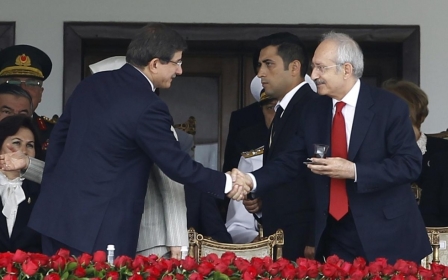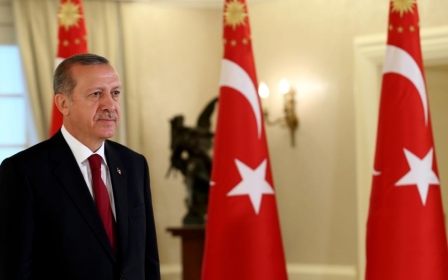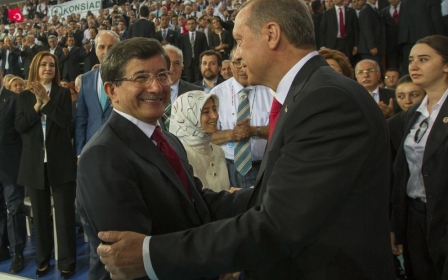Turkish government wins vote of confidence

The government of Turkish Prime Minister Ahmet Davutoglu won a vote of confidence in parliament on Saturday, little over a week after the former chief diplomat took over the position from long-time premier Recep Tayyip Erdogan.
Turkey's ruling Justice and Development Party (AKP) last week approved Davutoglu as successor to Erdogan, who has ruled Turkey as premier for over a decade with Islamic-tinted and development-focused policies. Erdogan was sworn in as president on Thursday after his victory in the 10 August election,.
Davutoglu's government got 306 votes in favour and 133 against in Saturday's confidence vote.
"With the support we received, we promise before our esteemed parliament and people to work day and night," Davutoglu told the parliament.
He said his government was keen on realising 2023 targets to build a "new Turkey" based on a new constitution, peace with Kurds and a booming economy.
Davutoglu, the former foreign minister, reaffirmed ambitious goals to make Turkey a top 10 global economy and a member of the EU by 2023 as he presented the programme of his new government on Monday.
Last week, Davutoglu's new cabinet was sworn in, including new names serving at the country's EU relations minister and customs and trade minister.
Despite the changes, analysts have said the cabinet is not expected to be a harbinger of significant policy changes, pointing out that Erdogan’s imprints are strongly visible in the choices for appointments
Opposition leader re-elected
On the other side of the political divide, Kemal K?l?çdaro?lu has been re-elected as chairman of the main opposition Republican People’s Party (CHP) after facing off a challenge from Muharrem ?nce.
“Today is a democracy fest. From now on, there is no disintegration but unity,” K?l?çdaro?lu told his party’s congress.
He promised a crackdown on dissidents and “elitists” within the party.
“There are elitists [within the party]; they save Turkey from their rak? tables. Everybody should perfectly know this: I will clear the party of these people. I am in need of hardworking men, not of those who speak at rak? tables,” K?l?çdaro?lu said in a speech at the congress.
“Have any of these [dissidents] promoted projects that we have produced? We’ll make more projects and work properly. I denounce elitism. I am a son of the Republic. I am Kemal of Dersim, revolutionary Kemal,” he added.
The CHP is the party of modern Turkey’s founder Mustafa Kemal Ataturk and has ruled the country for much of its existence since it was established in 1923.
The CHP’s ideology, Kemalism, is centred around maintaining Turkey’s secular character and regards the AKP as a trojan horse for the creeping Islamisation of the country.
The party has been involved in much soul-searching since Erdogan defeated their joint candidate with the ultra-nationalist Nationalist Movement Party, Ekmeleddin ?hsano?lu, in the Presidential elections.
Responding to accusations of authoritarianism, K?l?çdaro?lu restated his committment to democracy within the CHP, but added that he would still enforce the party line.
“Once the party approves a decision, then nobody can speak against these decisions on television channels. I will not allow this. The CHP is not a think tank. You can freely speak at universities or become the head of a civil society organization and speak the way you like. But you cannot violate the party program and internal regulations once you acquire the party identity card,” he said.
New MEE newsletter: Jerusalem Dispatch
Sign up to get the latest insights and analysis on Israel-Palestine, alongside Turkey Unpacked and other MEE newsletters
Middle East Eye delivers independent and unrivalled coverage and analysis of the Middle East, North Africa and beyond. To learn more about republishing this content and the associated fees, please fill out this form. More about MEE can be found here.




